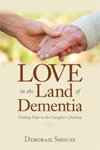Posts Tagged ‘Alzheimer’s Dementia’
Dementia in the Land of Vietnam
“We are here to see Dr. Nguyen Thanh Binh, head of the Department of Neuroloy and Alzheimer Diseaese,” I tell the guard at the National Geriatric Hospital of Vietnam in Hanoi, showing him my folded paper with her name printed on it.
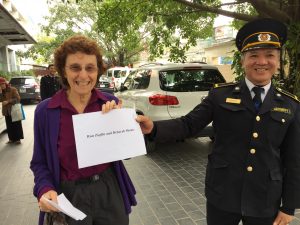 He grins, then points to a full size sheet of paper in the security booth’s window with our names printed on it. We follow him into the hospital and up a flight of stairs. After a short wait, Dr. Binh warmly welcomes us into her office. She has a table ready with chairs and tells us she has invited others from her department to talk to us as well. Another Dr. Nguyen Thanh Binh arrives. Her Phd thesis was on easing the burden for family caregivers. Dr. Ngan Thi Hong Anh, doctor of rehabilitation, joins us. She seeks non-medical solutions for improving quality of life. Nguyen Ngoc Anh, RN, completes our group. She works daily, communicating with and caring for people who are living with dementia.
He grins, then points to a full size sheet of paper in the security booth’s window with our names printed on it. We follow him into the hospital and up a flight of stairs. After a short wait, Dr. Binh warmly welcomes us into her office. She has a table ready with chairs and tells us she has invited others from her department to talk to us as well. Another Dr. Nguyen Thanh Binh arrives. Her Phd thesis was on easing the burden for family caregivers. Dr. Ngan Thi Hong Anh, doctor of rehabilitation, joins us. She seeks non-medical solutions for improving quality of life. Nguyen Ngoc Anh, RN, completes our group. She works daily, communicating with and caring for people who are living with dementia.
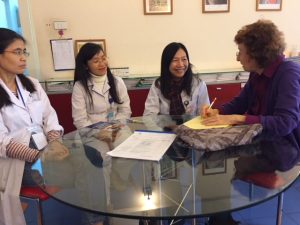 For two years. Dr. Binh and her team have been running a pilot study, inviting people who are living with dementia to attend a three day a week program that focuses on engaging socially, physically, emotionally, and intellectually. They use music therapy techniques, they bake traditional cakes together, and they enjoy various arts and crafts projects. All these therapies offer physical and occupational therapies, as well as vital social interactions. The project has been a huge success, with both family caregivers and people living with dementia enjoying the results. Besides giving the caregivers a much needed respite, families report improved quality of life and and increased abilities in the activities of daily living.
For two years. Dr. Binh and her team have been running a pilot study, inviting people who are living with dementia to attend a three day a week program that focuses on engaging socially, physically, emotionally, and intellectually. They use music therapy techniques, they bake traditional cakes together, and they enjoy various arts and crafts projects. All these therapies offer physical and occupational therapies, as well as vital social interactions. The project has been a huge success, with both family caregivers and people living with dementia enjoying the results. Besides giving the caregivers a much needed respite, families report improved quality of life and and increased abilities in the activities of daily living.
“Symptoms improve,” Dr. Binh reports. “Patients want to keep attending and families have their burdens eased.”
Dr. Binh and her team have extended the program.
 Often people come to the hospital, seeking answers to issues related to memory loss. Many elders live at home with extended families, and their children and grandchildren are frequently confounded by their cognitive impairments and other symptoms of dementia. Dr. Binh and her associates offer education, information, and comfort. They describe the disease and try to help families move beyond their initial feelings of hopelessness. They encourage families to accept and embrace their elder and support him or her in living a meaningful life.
Often people come to the hospital, seeking answers to issues related to memory loss. Many elders live at home with extended families, and their children and grandchildren are frequently confounded by their cognitive impairments and other symptoms of dementia. Dr. Binh and her associates offer education, information, and comfort. They describe the disease and try to help families move beyond their initial feelings of hopelessness. They encourage families to accept and embrace their elder and support him or her in living a meaningful life.
We left our meeting with these remarkable women feeling inspired. They are doing important work and making a difference for the people of Hanoi and Vietnam.
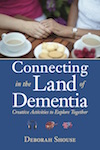
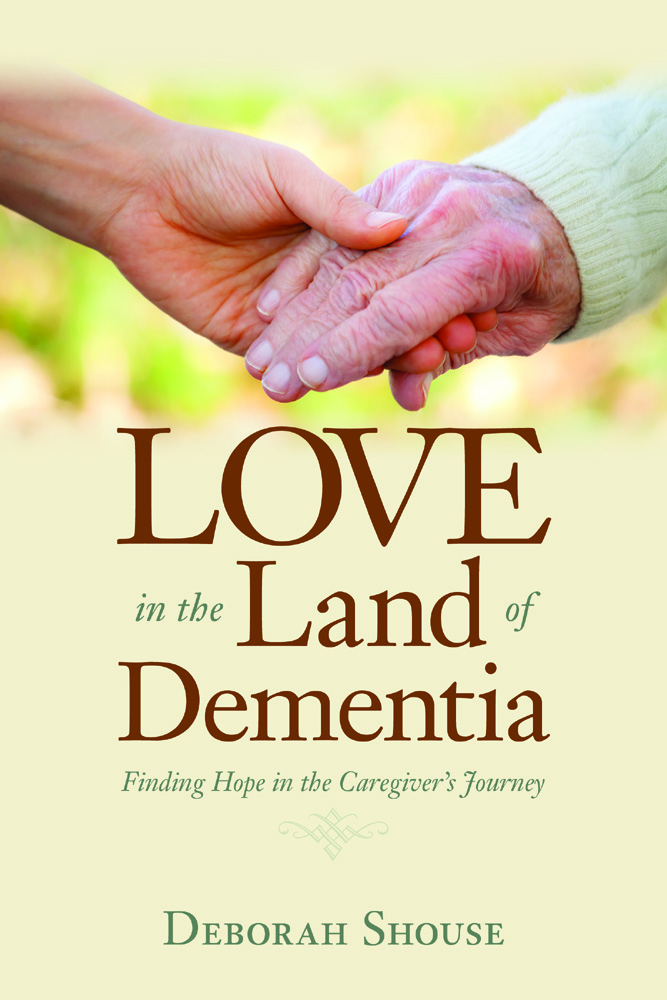
Moving from Depression to Purpose: Wisdom from Dementia Advocate and Mentor Robert Bowles, Jr.
Once again, Robert Bowles, Jr., age 65, could not sleep. Since he’d been diagnosed with Lewy Body Dementia two years ago, his nights had randomly been plagued with terrifying hallucinations and vivid nightmares that he often acted out. He was exhausted, depressed, and anxious. Plus, he had had to sell his beloved pharmacy and prematurely end a meaningful 40-year career as the community’s trusted pharmacist.
That dismal night, Robert awoke at 1:00 a.m. and dragged himself into his office. He felt a horrible heaviness in his heart
and he cried out to God.
“God,” he said, “Take me home. I don’t want my family to go through this disease. I can’t endure this any longer.”
As he sank into a chair, he heard a voice, as strong and clear as if someone was sitting right beside him: “Use your five life principles for people who are living with dementia.”
Robert slapped his hand onto his forehead and said to himself, “God is not through with me yet.”
And that realization filled him with hope.
Amending His Purpose: The Five Principles
Love, care, education, encouragement, and hope: these were the principles Robert adhered to with his work, his family, and in his community.
“Understanding that those same tenets could help families affected by dementia was a transformational experience that gave me purpose,” he says.
Robert believes, “People living with dementia need to be encouraged to maintain purpose. While your original purpose may not be possible, you can always modify your vision and continue to live with depth and meaning.”
Throughout his career, Robert was always purpose-driven and outcome-oriented. Along with those qualities, he infuses his current advocacy and mentoring work with compassion. Early on, he realized, “People don’t care what you know; they want to know what you care about.”
Standing up for Personhood
“I made a decision that I would not let dementia define who I was,” Robert says. “ I’m still Robert. I believe in personhood.”
He also believes in learning, overcoming fear, and trying new things. Robert serves on the Georgia Alzheimer’s and Related Dementias (GARD) State Plan Group. He is involved with the Lewy Body Dementia Association (LBDA) and works with the Dementia Action Alliance and the Dementia Spotlight Foundation. He qualified as a trainer at the Rosalyn Carter Institute and he completed the coursework to became a Certified Eden at Home Associate. Robert has also been trained in Dementia Beyond Drugs, which teaches ways to decrease behavioral expressions without medications.
Recently, a lady asked him, “How are you able to speak when you have dementia?”
Robert answered, “When I sit there waiting to speak, my mind is all over the place. I wonder, ‘Will I be able to speak, or is the train going to jump the track?’ Then I tell myself, “I am going to have fun.”
He has fun and he speaks from his heart. Audiences connect with him.
Recently, Robert told his neurologist, “I don’t have time to die.” Every year, he typically speaks to more than 100 groups, sharing his story, breaking down stereotypes, educating people on dementia, and inspiring people to live with heart and purpose. ##
 Practical Tips from Robert
Practical Tips from Robert
Adopt the ASAP philosophy: Acceptance, Socialization, Attitude, and Purpose. Accept your disease and know you are not your disease. Keep and expand your social network. Live with a positive attitude. Be fueled by a purpose. ASAP was one of the touchstones that delivered Robert from “the Valley of Darkness.” “Both care partners and people living with dementia benefit from ASAP concepts,” Robert says.
Prepare for your doctor’s visits. As a practicing pharmacist, Robert noticed many people did not prepare for medical visits and therefore didn’t get the information they most needed. He keeps a list of his symptoms. As changes occur, write them down. Before the visit, select your top three issues. Hand this list to the nurse to give to the doctor. “You save time and get better outcomes,” he says.
For more information about Robert, please visit:
https://lbdlivingbeyonddiagnosis.com/index.html
For more information about living well with dementia, please visit Dementia Action Alliance, https://daanow.org


A Winning Combination: Children, Exercise, and Music
An orderly group of five-year-olds walk into the dining room at Vernon Manor in Viroqua, Wisconsin. The residents are waiting for them. Each child goes up to an elder and introduces him or her self. Then Ingrid Constalie, AD-BC, CDP, Board Certified Activity Director and Certified Dementia Practitioner, talks to the assemblage about the importance of staying fit. The residents nod sagely: many of them are in their eighties and nineties and they exercise every day. But the days that the kindergartners join them are the best, a winning combination or children, exercise, and music.
The residents love teaching the kids the alphabetic movements to the iconic YMCA song. And the kids are a burst of giggles and wiggles as they fold their arms into wings, strut around, and teach everyone The Chicken Dance.
Ingrid’s focus is creating moments of joy, engagement, and connection.
Her intergenerational activities spark the residents and reduce the stigmas of aging and dementia by educating and informing local children, teens, their teachers, and other members of the community.
“This dancing and exercise exchange is simple, energizing, and very successful,” Ingrid says.
Sing-O at Bingo
Music Bingo offers middle schoolers a chance to work with Ingrid’s elders.
“This is about creating a good experience for your partners,” Ingrid coaches the children in advance. “You are their connection to the world.”
Ingrid plays an opening melody, using songs such as “Happy Trails,” “You Are My Sunshine,” and “Singing In the Rain.” Those who know the title shout it out. Often, partners confer with each other. The children help locate the song title on the bingo card and place a poker chip on each answer. Even people living with advanced dementia enjoy listening to music and being around the children.
Most of the time, the school children are chatty and at ease. But one girl was scared coming into the care community.
“I paired her with Helen, a woman deep into dementia,” Ingrid says. “Within minute, Helen had her arm around the girl and they were both laughing.”
Even children who act up at school are wonderfully behaved during the Bingo experience.
Creating Comparisons and Compassion
Recently, Ingrid orchestrated a project with a high school English class. They interviewed residents and did a comparison and a contrast. For example: “While Clara is getting out of bed with the assistance of staff, I am getting ready for school. While she wheels herself down a long hallway to a dining room, I am eating toast with my sister.”
The teenage journalists asked simple questions, like “What is your morning like?” “How do you spend your afternoon?” “How do you like to dress?”
The students wrote up the results and made booklets. One family was so inspired by the insights in the booklet, they later read parts of it at the woman’s funeral.
Ingrid’s intergenerational connections explore understanding, create empathy, and help create exciting new relationships.


7 Tips for Reducing Caregiver Isolation
Some years ago, when my mom was diagnosed with dementia, I didn’t know anyone else who was going through this journey. I felt very alone, even though I had a beautiful network of friends. I turned to writing to help me make sense of the situation. Eventually, I gathered the courage to share my personal essays with others, often through simply reading my stories aloud to friends and family. Being able to share my thoughts and feelings on this deeply meaningful dementia experience was so therapeutic, and it inspired me to reach out to other caregivers. Through my years as a family caregiver and through interviewing dozens of caregivers and experts in the field of dementia, I gleaned these 7 tips for reducing caregiver isolation.
Listening
When my friend Karen asked me to tell her more about my mom’s life, I was thrilled. I had been so immersed in my caregiving responsibilities, I had forgotten Mom’s fascinating adventures as a nurse in WWII, her worldwide travels, and more. Simply asking questions about the person who is living with dementia and listening avidly to the stories is a gift to the caregiver.
Visiting
“Your mother is so interesting,” my friend Jane said. Jane had offered to simply come to my house and have a short visit with me and Mom. My mother was going through a period of repetition and I had heard her tale of the natural hot springs in Iceland at least 113 times. But watching Jane lean forward, ask cogent questions, and smile at Mom allowed me to appreciate Mom’s stories in a new way. These were cornerstones in my mother’s life and Jane’s interest reminded me what treasures they were.
Enriching
Mom had been a vibrant movie-goer, an avid opera lover, and an ardent museum enthusiast. But when she could no longer go out, I loved it when people offered to bring arts, culture, and the occasional dog, to us. Studies show that even indirect contact with animals reduces stress. Visits from small dogs and cuddly babies boosted both our spirits and helped us feel connected with our community.
Bringing over an art book and gazing at favorite painters together invited out the creative spirit and were a catalyst for open-ended conversation. Singing and playing music with others stirred up positive memories and filled us with happiness and well-being.
Exercising
So often, caregivers forget the power of fresh air and exercise. They forget the joy of sunshine and trees. When they don’t have the steam to set out on their own, offering to take them on a stroll, a run, to a yoga class, or just to sit on a bench in a park, can offer moments of connection and renewal.
Noticing
“What can I do for you?” my life-partner often asked. Frequently, I was so overwhelmed I had no answer. So he asked me concrete questions. “Do you need any errands run?” “Would you like me to make dinner?” “Are there phone calls I can help you make? Grocery shopping I can do?” Offering to do simple tasks helped me understand I did not have to soldier through this alone. Help was all around me and one of my spiritual journeys was learning how to receive it.
Inviting
It’s not always easy to stay connected with friends who are living with dementia and their caregivers, but it is so worth it. Even when my mother felt lost at social gatherings, she still enjoyed the energy of being around empathetic friends. Even when she didn’t understand every speck of conversation, she relished being around others and meeting new people. So did my father and so did I. Having friends reach out with invitations reminded us we were still part of our community.
Asking
Sometimes we don’t know what to say to our friends who are caregivers for those living with dementia. We don’t know what to do. Then it’s time to simply state the truth and tell them, “I want to be there for you, to understand what you’re going through. I want to support you, and I don’t quite know how to do it. Can you guide me?”
Chances are the answer will be a warm hug and a resounding, “Yes.”


Inside Dementia: Finding Gifts in the Journey
“My husband and I have been married for 53 years,” a woman with delicately curled silver hair and mournful eyes told the group. “But in the two years since he was diagnosed with dementia, our relationship has changed.” She dabs at her eyes with a tissue and takes a breath. “It has grown even stronger. We are closer than we’ve ever been.”
Ron and I were in a conference room of caregivers in Ft. Wayne, Indiana, presenting for the Greater Indiana Chapter of the Alzheimer’s Association. We had just shared my story, Love in the Land of Dementia, and we were all talking about the gifts we have found in the dementia journey.
Another woman, whose husband was newly diagnosed, talked about her frustration and impatience before the diagnoses.
“Now that I understand what is going on, I have vowed to be more patient. I don’t want to waste a minute of our time together.”
“My husband doesn’t know who I am right now,” another woman said. “But the other day, he gave me such a compliment. He told me, ‘I want to marry you.’”
She told us how she rummaged in her cedar chest and showed her husband their marriage certificate. He read it with interest. Then he looked at her, eyes shining, and repeated, “I want to marry you.” Those words, so filled with love, lifted her spirits immeasurably. “To think that even now, when he doesn’t remember much of our lives together, he still loves me so much, that means a lot to me.”
She smiled, as we all applauded this amazing love.
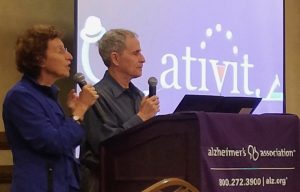 We heard more stories of amazing love at our earlier presentation in Merrillville, Indiana. When we talked about the gifts and blessings we had each discovered in the dementia journey, one woman told us, “I find it an honor to take care of my mother. She has done so much for me and I am lucky to get to care for her right now. I am glad to be able to show my unconditional love for her.”
We heard more stories of amazing love at our earlier presentation in Merrillville, Indiana. When we talked about the gifts and blessings we had each discovered in the dementia journey, one woman told us, “I find it an honor to take care of my mother. She has done so much for me and I am lucky to get to care for her right now. I am glad to be able to show my unconditional love for her.”
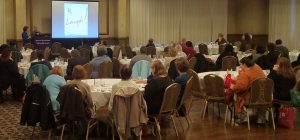
People shared many blessings—patience, the increased ability to live in the present, gratitude, flexibility, humor—but a deepening of love was the overarching message. We felt it during our own caregiving journeys, and we felt it deeply in the presence of those caregivers.
“The best and most beautiful things in this world cannot be seen or even heard, but must be felt with the heart.” Helen Keller
To learn more about the work the Greater Indiana Chapter of the Alzheimer’s Association is doing, please visit : https://www.alz.org/indiana/


Chocolate Boosts Brain Health!
As the daughter of someone who lived with dementia, I do a lot of things to boost my brain health. I try to walk 10,000 steps a day, along with other exercise. I eat blueberries and broccoli. I do squats, try to memorize a few words of Spanish, and think about taking harmonica lessons. I try new things, laugh often, and practice drawing. But a recent study revealed that I was intuitively doing something else that was cheering on my brain, something I hadn’t even counted. Just in time for Halloween, it turns out Chocolate Boosts Brain Health!
I recently encountered a fascinating study on the Harvard Health website, and was intrigued when I read this headline: Cocoa: a sweet treat for the brain
Imagine being in Italy and contributing to scientific research by drinking a luscious dark cocoa drink every day for eight weeks. Then imagine feeling even more lucid, vibrant, and healthy after that experience. That is the essence of the Cocoa, Cognition, and Aging (CoCoA) Study, published in the American Journal of Clinical Nutrition in December 2014, with this flavorful title: Cocoa flavanol consumption improves cognitive function, blood pressure control, and metabolic profile in elderly subjects. (Note: It turns out some of the “elderly” subjects are as young as 61, an age some of us may argue is merely “middle-age.”)
A Chocolate Boost Makes Your Brain Boast
I am also in love with this Maine-Syracuse Longitudinal Study (MSLS), of 968 people that includes these mouth-watering assertions:
All cognitive scores were significantly higher in those who consumed chocolate at least once per week, than in those who never/rarely consumed chocolate.
“More frequent chocolate consumption was significantly associated with better performance on the Global Composite score, Visual-Spatial Memory and Organization, Working Memory, Scanning and Tracking, Abstract Reasoning, and the Mini-Mental State Examination,” said the research team, which included scientists from the University of Maine.
More Delicious Cocoa-flavored News
And another study from Loma Linda University, states:
“Dark chocolate, which is 70 percent cacao, is a major source of flavonoids –- powerful antioxidant and anti-inflammatory components that are known to be beneficial to cardiovascular health. The California team’s initial studies at Loma Linda University have shown that absorbed cacao flavonoids penetrate and accumulate in regions of the brain associated with learning and memory.”
“We are tremendously excited about what these findings could potentially mean for brain health,” said Lee Berk, DrPH, MPH, who led the team. “This may open the door for potential restorative uses for individuals with memory/recall or dementia and aging-related issues.”
Never Forget To Boost Your Brain
I now have a remedy for those days when I’m too tired to exercise, too busy for a crossword, too cranky for a brain game. Or for when I simply forget. On those days, I’ll simply treat myself to a taste of the dark side. And hope it leads me towards the light.
Want to learn more?
http://www.goodnewsnetwork.org/study-confirms-brain-and-memory-benefits-from-dark-chocolate/
http://www.health.harvard.edu/blog/cocoa


Widening the World Through Travel
As the waiter served dessert, Lori La Bey looked around the table at her family and smiled. She couldn’t believe she had pulled this off — her children, her siblings and their children, and her parents all enjoying a Caribbean cruise together. Her mother was living with Alzheimer’s and her father had brain cancer: they had assumed they wouldn’t get to travel again. They were beaming and Lori knew all her planning had been worth it. She was widening the world through travel.
She still treasures the family pictures from this trip. This meaningful travel experience inspired Lori, founder and host of Alzheimer’s Speaks, to orchestrate a cruise for people who are living with dementia and their families.
“Travel is a normal part of life,” Lori says. “When you stop traveling, your world becomes smaller.”
From her years caring for her mom, Lori understands how easy it is to feel isolated and stuck. She also understands the joy of engaging in the world, trying new things, and meeting new people. Her trip enriched her family and she wants to offer others that gift of connection and adventure.
Lori also learned some tips from traveling with her parents. Here are a few ideas for creating a smooth traveling experience for yourself and for someone who is living with dementia:
Create a flexible travel experience. Lori chose cruising because it can be reasonably priced, you can unpack once and stay in the same room the entire trip, and there’s lots of flexibility with eating (including free room service), activities, and touring. Cruising is also ideal for the intergenerational experience, offering activities for all ages.
Make the person living with dementia part of planning the trip. Discuss the trip with all involved, asking for feedback and talking about what each person really wants to do. Incorporate those dreams into the trip.
Empower your travelers. Lori packed all her parents things into one giant suitcase. Her father had always been the one managing the luggage and he really wanted something to carry. “I hadn’t thought to pack a couple of small bags so he and my mom could feel like regular travelers,” Lori says. “People want something to be in charge of so they don’t feel left out.”
Work with a travel agent and make your life easier. Plan in advance for noise, long transfers, layovers, long car rides, and other chaos. If flying, call the airport if you need to arrange for wheelchairs or other inner airport transportation. To mute noises, bring earplugs. Carry along items that soothe and comfort each of us, including favorite music and head phones. If you’re cruising, talk to the cruise lines in advance, discussing special needs, including dietary, medical, and any mobility issues.
Take pictures and videos and document these precious moments. You’ll enjoy looking through these memories again and again together.
“Travel is about being together and widening your world,” Lori says. “It’s a wonderful way to build those moments of magical and meaningful connection.”
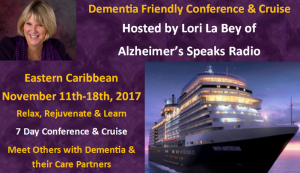
For an amazing way to widen your world, consider Lori’s upcoming November Dementia Friendly Conference and Cruise. Lori and a team of educators, including a panel of inspiring people who are living with dementia, have planned a nurturing, connecting, educational, and inspiring Caribbean trip. For more information, visit, https://alzheimersspeaks.com/cruise-with-us
A Better Visit in the Land of Dementia
I’m always amazed at how a change of perspective can widen your heart and open your eyes. This is a story of how my friend helped me look at my mom in a new way and gave me me a better visit in the land of dementia.
Many weekday afternoons I stole away from my workday for a little rendezvous. I drove far into the southern part of the city.
There I hurried through the lobby, walked swiftly down the corridors and until I reached the locked door. There I punched in a secret code that allowed me into the inner sanctum, the memory care unit where my mother lived.
Walking into my mother’s room was always a surprise: I never knew who would greet me; a sweet curly-haired woman wearing a pink sweat suit and looking quietly compose? An anxious haggard woman who bent to pick up invisible lint on the floor and jabbered with invisible creatures lurking in the corners? Or an exhausted former beauty, lying across the single bed wearing an orange pullover and an adult diaper? My task was to appreciate every aspect of my complicated mother and whoever she was at the moment.
When my friend Maril asked, “Can I go with you to visit your mother?” I felt like a flutter of angels had gathered around me.
“Really?” I asked. “You want to see Mom with me?”
She did. I prepared her for our visit, describing Mom’s various moods. Maril did not seem shocked, worried or afraid. I told her about walking into the sometimes chaotic energy of the locked Alzheimer’s unit. She simply nodded as if this were an ordinary occurrence, which, for me, it was.
The day of our visit I felt lightness inside; I was eager to share my secret world with my friend.
Throughout the years, Mom has always been gracious with my friends and that day was no exception. Mom was sitting at a table in the dining room with a magazine in front of her. She looked pretty and serene and she smiled when we came in. We sat next to her and Maril took her hands.
“How are you Fran?” Maril said, looking into my mother’s eyes.
“Well I you know the scatter of it all,” my mother answered.
“I do know the scatter of it all. How are you getting along here?”
“Like a diamond in the sky,” my mother said.
As I listened to my mother and my friend talk, I was so moved.
“Your mother is really something,” Maril said as we left the home. “I enjoyed seeing her. I’d like to go again with you sometime.” I was proud of my mother’s poetic and eccentric answers, proud of the way she engaged in the conversation. And I was grateful that my friend was able to appreciate my mother, listen to her words and intuit their deeper meaning.
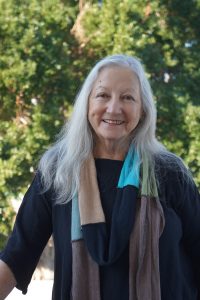
 The visit was a huge gift for me. Seeing Maril engage with and appreciate my mom just as she was reminded me of the depths of my mother’s many talents and facets. This knowledge later helped me get through those moments when my mother seemed faraway or lost. My friend reminded me that there are so many ways to carry on a good conversation. All you need is attention, intention and love.
The visit was a huge gift for me. Seeing Maril engage with and appreciate my mom just as she was reminded me of the depths of my mother’s many talents and facets. This knowledge later helped me get through those moments when my mother seemed faraway or lost. My friend reminded me that there are so many ways to carry on a good conversation. All you need is attention, intention and love.
Deborah Shouse is the author of Connecting in the Land of Dementia: Creative Activities to Explore Together and Love in the Land of Dementia: Finding Hope in the Caregiver’s Journey.
The Marvels of Misplacing
“I don’t know where my glasses are,” Mom tells me. I bite my lip; she’s been misplacing things all day. We are supposed to be spending a day drawing and painting, trying to connect mom with the artist she used to be. We are supposed to bake cookies together and look through magazines. But I’ve been spending much of the time crawling around, looking under the sofa and chairs and between the cushions for the disappearing glasses.
“Let’s make our cookies. You won’t need your glasses for that,” I say.
“I need my glasses.”
As I search, I wonder when it became a drudgery instead of a joy to find things. One of my favorite childhood games was Hide ‘N Seek. I loved being the Seeker, loved the surprise of finding someone in a tucked away, mysterious place. I had a special trick I used when I was “It.” I would close my eyes and say, “If I were Dan, where would I hide?” Then an image floated into my mind and I’d race to the hiding place. Half the time, I was right.
Do I still have “it?” I close my eyes and think, “If I were Mom’s glasses, where would I be?” The refrigerator comes to my mind. I rush into the kitchen and fling open the refrigerator door, only to see the usual chaos. But I’m hungry, so I reach for an apple. Behind the fruit is a pair of reading glasses, sprawled across the shelf.
Triumphantly, I take the glasses to Mom.
“These feel nice,” she says.
Not only has my mother reminded me of the importance of creativity, curiosity and play, but she also discovered a great summer time tip: chill your glasses and cool off your face.
Deborah Shouse is the author of Connecting in the Land of Dementia: Creative Activities to Explore Together and Love in the Land of Dementia: Finding Hope in the Caregiver’s Journey.
Laughing During the Dementia Journey: A Map to Increased Health and Happiness
“I feel so much better after all this laughing,” our friend told us. “My brain fog has lifted. I feel myself again.” Our friend has been struggling with memory issues and a dimness in her thinking. We had a wonderful time practicing laughing exercises with her. The more we laughed together, the easier and more spontaneous our laughter flowed. Laughing during the dementia journey left us all feeling healthier, happier, and more energized.
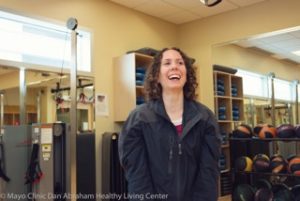 As I develop my own laughter practice, I wanted to know more from someone who’s really integrated laughing into her life. I asked Amy Kuth to share her insights. Amy is a Health & Wellness Coach at Mayo Clinic’s Dan Abraham Healthy Living Center in Rochester, MN. She has been practicing laughter for several years and has created an on-going Laughter Club for Mayo employees. She recently completed a five-day teacher training course. Here is my Q and A with Amy.
As I develop my own laughter practice, I wanted to know more from someone who’s really integrated laughing into her life. I asked Amy Kuth to share her insights. Amy is a Health & Wellness Coach at Mayo Clinic’s Dan Abraham Healthy Living Center in Rochester, MN. She has been practicing laughter for several years and has created an on-going Laughter Club for Mayo employees. She recently completed a five-day teacher training course. Here is my Q and A with Amy.
What benefits have you seen from your laughter yoga practice?
Laughter yoga helped me discover my playful side again after it had gotten buried under life pressures and self-criticism. Since I started leading laughter yoga and having a regular laughter practice I have become more confident, creative, and playful at home and in my workplace. Laughter brings me into the present moment, creates harmony in my mind/body/spirit, connects me to those that I am laughing with, and always puts me in a good mood! I also set a daily intention to bring extra laughter into my specific work unit, outside of the laughter yoga sessions. Doing this elevates our mood, encourages playfulness, increases creativity, and brings us closer together as a team.
How has your team, working in Employee Health at Mayo, benefitted from the extra laughter? 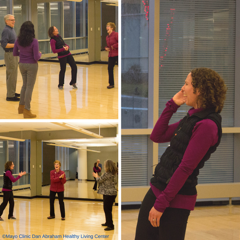
In the weekly Mayo Clinic Laughter Club, we do a one word check-in at the end of our laughter yoga sessions. Words include: relaxed, energized, calm, happy, stress-free, , warm, peaceful, and grateful. These sessions are a great way for participants to take a break from work and other responsibilities, and to refresh and reset. The benefits of these sessions are then carried into the rest of their day.
What are some quick ways to add a splash of laughter into your day?
Plenty of haha’s a day keep the doctor away!
Here are a few ideas for adding a quick splash of laughter to your day:
- Surround yourself with positive people and things.
- Laugh in your car while you are driving to work.
- Affirm yourself with a smile and laughter while looking in the mirror.
- Smile at someone else and see what happens.
- Attend a laughter yoga club.
- Add humor to your day through media, fun activities, and social connections.
- Have a laughter buddy.
- Laugh into your cell phone, even if nobody is on the other line.
- Join a live laughter party on the phone.
- Set a timer for one-minute and just laugh until the time is up.
Why is adding laughter to our day important?
In a typical day, laughter is usually sporadic and short lived. In order to gain the most benefit from laughter it needs to be long and deep, stimulating the diaphragm. Intentionally adding laughter to our day helps us receive these benefits. The benefits of laughter can be summarized simply by remembering the 5 H’s, which I learned in my teacher training.
Happy : Laughter makes us happier by elevating our mood and attitude. We do better in life with a improved mood and attitude.
Healthy: Laughter improves our immune system and physical health. When we are healthier we can do more.
Harmony: Laughter oxygenates and creates harmony in our body and brain. What we do is more effective and efficient.
Heartfelt: Laughter enriches our relationships and creates connection with others and with our self. Laughter is a universal language that breaks down barriers and causes judgment and self-criticism to fade.
Hopeful: Laughter increases resilience. We bounce back better from adversity.
For more information about Laughter Yoga and about laughing during the dementia journey, please visit: www.laughteryoga.org or http://robertrivest.com
Deborah Shouse is the author of Connecting in the Land of Dementia: Creative Activities to Explore Together and Love in the Land of Dementia: Finding Hope in the Caregiver’s Journey.



